#arabic language study abroad
Text
Best Place To Learn Arabic Online In Jordan

Best Place To Learn Arabic Online In Jordan
The best place to learn Arabic online in Jordan is the online Arabic language courses. The Arabic online courses are the most amazing ways for people to learn the Arabic language without issues and chaos.
#learn arabic language in jordan#arabic language study abroad#best arabic language schools in jordan#study arabic language in jordan#study arabic language#arabic courses for beginners in jordan
0 notes
Text
George Ashford
10/11/2023
Reflection
Traveling through Tunisia, I saw the marks of the many cultures that have found a home here throughout history. A Roman coliseum. Amazigh villages carved into the desert. A Sunni mosque made of Roman columns and a Shi'a fortress guarded by Ottoman cannons. The monumental art-deco and brutalist structures of the capital. An ancient synagogue rumored to contain stones from another, even more ancient temple that stood where Abraham obeyed and Isaac was spared. They tell a story that spans thousands of years, a story of colonization, assimilation, war, and the advent of a nation.
One part of the story begins on the island of Djerba. The Ghriba Synagogue, purportedly the oldest Jewish site in Africa, sits near the center. No one knows for certain how old it is, but legend has it that the high priests of the Temple Mount fled to Djerba after Nebuchadnezzar and the Bablylonians sacked Jerusalem, carrying a stone and a door from the First Temple to build anew. As he shows us around a traditional Amazigh house, dug two stories deep into the soft desert dirt, a light-eyed man in a baseball camp explains that his people were once Jewish. That is why they sheltered Jews during the holocaust, he says, pointing to a metal helmet from WWII hung on a stick bannister. With a few exceptions, the Amazigh are not Jewish anymore, as evidenced by the woman in hijab who serves us tea while we watch the sunset wash over the small circle of sky visible from the open pit at the center of the house, but the man is proud to tell us that they once were. He is staking a claim to Tunisia’s story, reminding us that it began before the Arabs arrived, and that his ancestors were here before Islam. Although he does not make it a point to tell us, they were here before Judaism too.
In Kairouan, conquests are layered onto one another in the very foundations of the city. As we look out over the massive cisterns that held the water for the ascendant Umayyad caliphate’s first outpost in the region, we learn that it gets its name from the Arabic word for a military caravan. The outpost was to protect the new settlers from the Amazigh, who staged a series of successful rebellions before being defeated and gradually converting to Islam. We do not have to explore Kairouan for long, however, to see that the The Umayyads were not the first conquerors to make their mark here. The columns of the majestic Great Mosque of Kairouan are carved in the Greco-Roman style, clearly repurposed from older buildings. Some of the stones in the outer wall have latin writing on them. 70 kilometers away, closer to the coast, the towering Roman amphitheater in El-Jem testifies more explicitly to the power of the empire that counted this part of North Africa among its first and hardest won territories.
After El-Jem, we stop in Mahdia. The insurgent Fatimid caliphate, tracing their lineage back to the Prophet’s daughter, founded the city as their first capital a few hundred years after the Umayyads founded Kairouan. They would go on to capture Egypt and the rest of North Africa from the ruling Abbasid dynasty, spelling the end of a united Arab empire in the Mediterranean. We walk along the parapet of a fortress looking out over bright blue ocean on three sides. We imagine seeing
ships coming over the horizon and scrambling to man the defenses, as so many must have over the centuries. Genoese, Norman, Spanish, French, and Ottoman raiders all came by sea to Mahdia, its well-fortified harbor making it a prime toehold for a long line of would-be conquerors.
The latest conqueror in that line is most visible in Tunis, where art-deco facades adorn the most prominent buildings in the city center. It is also audible in the French words and accent woven into Tunisia’s unique dialect of Arabic. Tunis also, however, tells of something new. Hulking government buildings and hotels made from the ubiquitous concrete of the late 20th century overlook Habib Bourguiba Avenue. They proclaim the sovereignty of a people that is not quite of the ancient desert tribes nor any of their conquerors. Our professor points out the site of famous protests where Tunisians proclaimed a more personal form of sovereignty, demanding political freedom and economic opportunity and getting at least the former.
Tunisia is an Arab country. Hearing the language and the call to prayer every day make that clear, and Kairouan tells the story of how it became so. It is not, however, a solely Arab country, just as the story of Kairouan is not Tunisia’s only story. Djerba, El-Jem, Tunis, Mahdia, and the Amazigh villages tell other stories about Tunisia, stories that include elements of the French story, the Jewish story, the Ottoman story, the Roman story, and the story of the Amazigh. With revolution for national, and then for personal independence as the most recent chapters, they weave together into one, rich, cohesive, Tunisian story. It has been a fascinating story to learn these past few months, and I look forward to someday knowing it in more detail.
Expressions
One of the most common Tunisian expressions is to say صحة when someone is eating, gets out of the shower, or buys new clothes. The response is يا أتك صحة. The expression literally translates just to ‘health,’ and expresses encouragement of healthy activities like eating.
ما يْحِس بِالجمْرة كان الّي يعْفِس عْليها is a less common Tunisian proverb that translates literally to ‘only he who walks on embers can feel it.’ It expresses the idea that one should not judge or criticize the struggles of someone else, since it is impossible to know what they are really going through.
Photos
أركان رومانية في جامع قيروان الأكبر
George Ashford
10/11/2023
Reflection
Traveling through Tunisia, I saw the marks of the many cultures that have found a home here throughout history. A Roman coliseum. Amazigh villages carved into the desert. A Sunni mosque made of Roman columns and a Shi'a fortress guarded by Ottoman cannons. The monumental art-deco and brutalist structures of the capital. An ancient synagogue rumored to contain stones from another, even more ancient temple that stood where Abraham obeyed and Isaac was spared. They tell a story that spans thousands of years, a story of colonization, assimilation, war, and the advent of a nation.
One part of the story begins on the island of Djerba. The Ghriba Synagogue, purportedly the oldest Jewish site in Africa, sits near the center. No one knows for certain how old it is, but legend has it that the high priests of the Temple Mount fled to Djerba after Nebuchadnezzar and the Bablylonians sacked Jerusalem, carrying a stone and a door from the First Temple to build anew. As he shows us around a traditional Amazigh house, dug two stories deep into the soft desert dirt, a light-eyed man in a baseball camp explains that his people were once Jewish. That is why they sheltered Jews during the holocaust, he says, pointing to a metal helmet from WWII hung on a stick bannister. With a few exceptions, the Amazigh are not Jewish anymore, as evidenced by the woman in hijab who serves us tea while we watch the sunset wash over the small circle of sky visible from the open pit at the center of the house, but the man is proud to tell us that they once were. He is staking a claim to Tunisia’s story, reminding us that it began before the Arabs arrived, and that his ancestors were here before Islam. Although he does not make it a point to tell us, they were here before Judaism too.
In Kairouan, conquests are layered onto one another in the very foundations of the city. As we look out over the massive cisterns that held the water for the ascendant Umayyad caliphate’s first outpost in the region, we learn that it gets its name from the Arabic word for a military caravan. The outpost was to protect the new settlers from the Amazigh, who staged a series of successful rebellions before being defeated and gradually converting to Islam. We do not have to explore Kairouan for long, however, to see that the The Umayyads were not the first conquerors to make their mark here. The columns of the majestic Great Mosque of Kairouan are carved in the Greco-Roman style, clearly repurposed from older buildings. Some of the stones in the outer wall have latin writing on them. 70 kilometers away, closer to the coast, the towering Roman amphitheater in El-Jem testifies more explicitly to the power of the empire that counted this part of North Africa among its first and hardest won territories.
After El-Jem, we stop in Mahdia. The insurgent Fatimid caliphate, tracing their lineage back to the Prophet’s daughter, founded the city as their first capital a few hundred years after the Umayyads founded Kairouan. They would go on to capture Egypt and the rest of North Africa from the ruling Abbasid dynasty, spelling the end of a united Arab empire in the Mediterranean. We walk along the parapet of a fortress looking out over bright blue ocean on three sides. We imagine seeing
ships coming over the horizon and scrambling to man the defenses, as so many must have over the centuries. Genoese, Norman, Spanish, French, and Ottoman raiders all came by sea to Mahdia, its well-fortified harbor making it a prime toehold for a long line of would-be conquerors.
The latest conqueror in that line is most visible in Tunis, where art-deco facades adorn the most prominent buildings in the city center. It is also audible in the French words and accent woven into Tunisia’s unique dialect of Arabic. Tunis also, however, tells of something new. Hulking government buildings and hotels made from the ubiquitous concrete of the late 20th century overlook Habib Bourguiba Avenue. They proclaim the sovereignty of a people that is not quite of the ancient desert tribes nor any of their conquerors. Our professor points out the site of famous protests where Tunisians proclaimed a more personal form of sovereignty, demanding political freedom and economic opportunity and getting at least the former.
Tunisia is an Arab country. Hearing the language and the call to prayer every day make that clear, and Kairouan tells the story of how it became so. It is not, however, a solely Arab country, just as the story of Kairouan is not Tunisia’s only story. Djerba, El-Jem, Tunis, Mahdia, and the Amazigh villages tell other stories about Tunisia, stories that include elements of the French story, the Jewish story, the Ottoman story, the Roman story, and the story of the Amazigh. With revolution for national, and then for personal independence as the most recent chapters, they weave together into one, rich, cohesive, Tunisian story. It has been a fascinating story to learn these past few months, and I look forward to someday knowing it in more detail.
Expressions
One of the most common Tunisian expressions is to say صحة when someone is eating, gets out of the shower, or buys new clothes. The response is يا أتك صحة. The expression literally translates just to ‘health,’ and expresses encouragement of healthy activities like eating.
ما يْحِس بِالجمْرة كان الّي يعْفِس عْليها is a less common Tunisian proverb that translates literally to ‘only he who walks on embers can feel it.’ It expresses the idea that one should not judge or criticize the struggles of someone else, since it is impossible to know what they are really going through.
Photos
أركان رومانية في جامع قيروان الأكبر
كنيس الغريبة في جربة
كنيس الغريبة في جربة
0 notes
Text
Arabic language course in jordan
Al Baher Arabic Language Training Center provides comprehensive, evidence-based Arabic language instruction for students of all levels and ages who are interested in an unforgettable study abroad experience through supportive secure, and cultural environments. Established in 2005 and located in Amman, Jordan, Al Baher’s mission is to support Arabic language learners in their professional, personal, and academic development through a variety of immersion and instruction courses. Al Baher offers its services through committed, educated instructors with extensive experience in language development. Learn, study and improve your Arabic with us for a unique and life-changing experience. We promise you a great learning environment, fun and interesting lessons, professional teachers, good value accommodation and the chance to explore Amman one of the world's most exciting cities.
#Learning arabic in jordan#Arabic language course in jordan#Arabic course in jordan#Learn Arabic in jordan#study Arabic in jordan#Arabic abroad institute jordan#Arabic institute in jordan#Arabic School in jordan
1 note
·
View note
Text
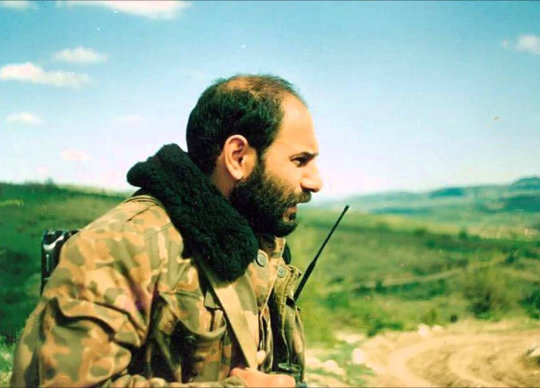
Monte Melqonyan/Մոնթե Մելքոնյան (1957-1993)
Honestly, I don't even know where to begin. He's one of those extraordinary individuals about whom countless books could be written and numerous movies could be made, yet still, so much would remain untold. You might wonder, "He's a National Armenian Hero—cool, but why should I know about him?" My answer is simple: if the world had more people like him, especially in today's times, it would be a much better place. He fought for justice, embodied culture and education, and radiated a deep love for his people and humanity as a whole. I believe everyone should aspire to have a little bit of Monte's spirit within them, regardless of their nationality.
Now, it's important to note that some things written about him in the Western press can be questionable and inaccurate. So, I would advise taking most of the information from those sources with a grain of salt.
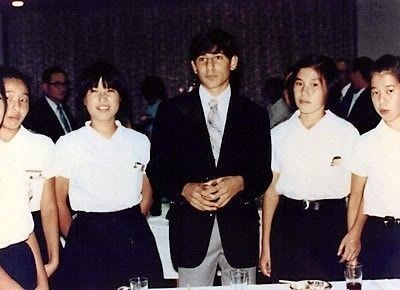
Monte was born on November 25, 1957, into an Armenian family in Visalia, California, that had survived the Armenian Genocide. From 1969 to 1970, his family traveled through Western Armenia, the birthplace of his ancestors. During this journey, Monte, at the age of twelve, began to realize his Armenian identity. While taking Spanish language courses in Spain, his teacher had posed him the question of where he was from. Dissatisfied with Melkonian's answer of "California", the teacher rephrased the question by asking "where did your ancestors come from?" His brother Markar Melqonyan remarked that "her image of us was not at all like our image of ourselves. She did not view us as the Americans we had always assumed we were." From this moment on, for days and months to come, Markar continues, "Monte pondered [their teacher Señorita] Blanca's question Where are you from?"
In high school, he excelled academically and struggled to find new challenges. Instead of graduating early, as suggested by his principal, Monte found an alternative - a study abroad program in East Asia. The decision to go to Japan was not random. He had been attending karate clubs and was the champion of the under-14 category in California. He also studied Japanese culture, including taking Japanese language courses. After completing his studies at a school in Osaka, Japan, he went to South Korea, where he studied under a Buddhist monk. He later traveled to Vietnam, witnessing the war and taking numerous photographs of the conflict. Upon returning to America, he had become proficient in Japanese and karate.
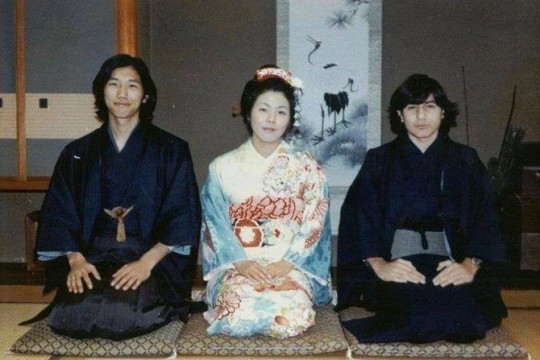
Having graduated from high school, Monte entered the University of California, Berkeley, with a Regents Scholarship, majoring in ancient Asian history and archaeology. In 1978, he helped organize an exhibition of Armenian cultural artifacts at one of the university's libraries. A section of the exhibit dealing with the Armenian Genocide was removed by university authorities at the request of the Turkish consul general in San Francisco, but it was eventually reinstalled following a campus protest movement. Monte completed his undergraduate work in under three years. During his time at the university, he founded the "Armenian Students' Union" and organized an exhibition dedicated to the Armenian Genocide in the late 19th and early 20th centuries in the Ottoman Empire and the Republic of Turkey.
Upon graduating, he was accepted into the archaeology graduate program at the University of Oxford. However, Monte chose to forgo this opportunity and instead began his lifelong struggle for the Armenian Cause.
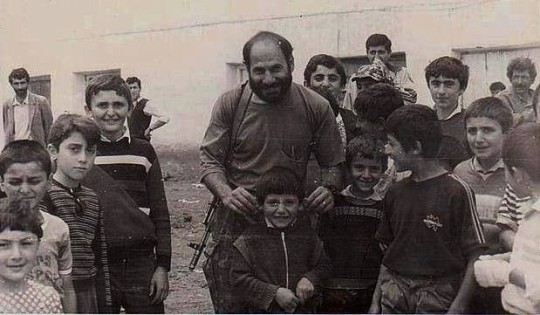
In the fall of 1978, Monte went to Iran and participated in demonstrations against the Shah. Later that year, he traveled to Lebanon, where the civil war was at its peak. In Beirut, he participated in the defense of the Armenian community. Here, he learned Arabic and, by the age of 22, was fluent in Armenian, English, French, Spanish, Italian, Turkish, Persian, Japanese, and Kurdish.
From 1980, Monte joined the Armenian Secret Army for the Liberation of Armenia (ASALA – I promise to tell you more about them later) and quickly became one of its leaders. In 1981, he participated in the planning of the famous Van operation. In 1981, he was arrested at Orly Airport in France for carrying a false passport and a pistol. During his trial, Monte declared, "All Armenians carry false passports—French, American—they will remain false as long as they are not Armenian." Over the following years, he perfected his military skills at an ASALA training camp, eventually becoming one of the group's principal instructors.
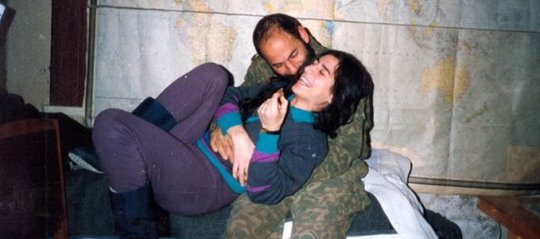
Monte with his wife Seda
After being released from a French prison (once again) in 1989, Monte arrived in Armenia in 1991, where armed clashes between Armenians and azerbaijanis had already begun. He founded the "Patriots" unit and spent seven months in Yerevan working at the Academy of Sciences, writing and publishing the book "Armenia and its Neighbors." In September of the same year, he went to the Republic of Artsakh to fight for his fatherland and its people. Due to his military expertise, he was appointed Chief of Staff of the Martuni defense district in 1992. His sincerity and purity quickly won the love and respect of the local population and the Armenian community as a whole.
Throughout his conscious life, Monte fought for the rights of Armenians, recognition of the Armenian Genocide, and the reclamation of Armenian homeland.
There are various versions of Monte Melqonyan's death circulating in both Armenian and azerbaijani media. According to official Armenian information, Monte was killed on June 12, 1993, by fire from an azerbaijani armored vehicle.
Monte remains a lasting testament to the incredible potential unleashed when the Armenian patriotic heart unites with sharp intellect.
youtube
In case you'd like to put a voice to the face and hear about the Artsakh struggle directly from Monte, here he is speaking about it in English.
#so many things have been left out#but I guess this is a good starting point#I promise to tell you more about ASALA and Van Operation in near future#monte melqonyan#armenia#armenian history#armenian culture#world history#artsakh#artsakh is armenia#translated literature#մոնթե մելքոնյան
222 notes
·
View notes
Text
I hope everyone whose been running their mouth about rebuilding diasporic Jewish culture and evil Zionist Hebrew destroying Yiddish, ladino, and judeo-Arabic knows that even the most mild limitations on contact with Israeli academia/study abroad programs/flow information would be a disaster for an already struggling field with extreme financial constraints and a very very limited time frame to record native speakers (who for every diasporic language apart from Yiddish almost entirely live in Israel or have language institutions based in the state of Israel), develop curricula, and stabilize/retransmit the language
#It would be very very bad for Yiddish studies too#On the msot basic level academic and professional proficiency in modern Hebrew is often a requirement and that’s very hard to achieve#Without immersion in ha’aretz
86 notes
·
View notes
Text
It's so funny to me that Kaoru is the only fully monolingual person in UNDEAD when his VA speaks fluent English asdfghjkl.
For reference:
Rei: Japanese, Japanese Sign Language (translated for Adonis in Nightless City Live), English (studied abroad in London, shown in Operetta), possibly a bit of Romanian and/or Mandarin (family from Romania, spent time in Shanghai).
Adonis: Japanese, Japanese Sign Language (started learning to communicate across languages in the Special Music Zone), his home country's language (likely Arabic), English (teaches Souma).
Koga: Japanese, Japanese Sign Language (he's a bit more beginner than the other two but is learning from Adonis and can speak some).
Kaoru: Only Japanese and whatever he's picked up from anyone else lol.
Also, fun fact, but Arashi is the only monolingual one in Knights as well! Tsukasa and Ritsu speak English and Izumi and Leo speak Italian. Her seiyuu (Kitamu) is monolingual as far as I know tho lol.
#ensemble stars#enstars#ensemble stars music#enstars undead#kaoru hakaze#rei sakuma#adonis otogari#koga ogami#koga oogami
124 notes
·
View notes
Text
Some other Palestinian Fundraisers I want to share
These are Palestinian fundraisers my friend from my uni’s Palestine solidarity encampment asked me to share. Both are Gazan students and writers seeking evacuation funds.
Eman Alhaj Ali
Eman is a 22-year-old English literature and translation student. She is a writer and has published her writing in different news outlets including Al Jazeera. She has 4 young siblings: Doaa (6), Abduallah (8), Yousef (11), and Ahmad (12). Eman seeks to evacuate herself and her family and to complete her education abroad.
You can find her on Instagram here: eman.alhajali. You can see all the writing she has done on her IG (she has even written for news media like Al Jazeera, Middle East Eye, and The New Arab!))
Currently $40,679 USD raised of $70,000 target.
Here is a link to the writing Eman has written for Al Jazeera:
Muhammed Elbaba
Muhammed has just finished high school and was planning to become a pediatrician. He has 4 siblings. He is a talented student who is very skilled in language and has even cooperated with international television stations. He has received special training in journalism and media because of this. He has now lost his home and his family members have been killed and injured. He is raising funds to 1) treat his brother who is injured and suffering from amenia, 2) evacuate out of Gaza, and 3) continue his dream of studying abroad.
You can find his Instagram here: mohmd_elbaba. You can see that he has had his account since 2020 and has been geotagged in Gaza in his 2022 posts.
Currently $14,619 USD raised of $35,000 target.
As far as I know, neither of them have a Tumblr account. I hope you will still share and donate if you can to both of them!
#palestine#gaza#free gaza#free palestine#gaza genocide#donations#fundraising#gaza fundraiser#gaza gofundme#palestine gofundme#palestine fundraiser#gaza gfm#palestine gfm#Eman Alhaj Ali#Muhammed Elbaba
5 notes
·
View notes
Text
About Me!
Hello again, Langblrs! It sure has been a minute and a lot has changed since I last logged in! I’ve made a few posts already since I’ve gotten back into studying Russian, but I’m not going to get ahead of myself. Let’s start with the basics:
I’m Sisi (see-see), I’m 25 years old, and I live in the northeast USA. I’ve studied languages in school and autonomously for as long as I can remember. I graduated from college in 2021 with two Bachelors Degrees— one in Political Science and the other in Spanish. During my time at my university, I took classes in Spanish (of course, it was one of my majors), French, Arabic, Italian, and German. Outside of my university, I have studied Russian and Norwegian. I was fortunate enough to study abroad during undergrad as well, so I spent a good portion of 2019 in Granada, Spain perfecting my Spanish to fluency.
Fast forward a few years, I am now a Flight Attendant with the #1 airline in the US and I couldn’t be happier. I have traveled everywhere— North America (I just saw the Aurora Borealis in Alaska!), Central and South America, Africa, Europe, Asia, anywhere you can imagine! I get paid to see the world which has always been a dream of mine. Traveling and interacting with people of various backgrounds, cultures, and languages has been the best experience of my life.
Now more personally, I am vegan! I care deeply about the earth and ALL its inhabitants— every life holds the same value. This sentiment of total equality carries through to my political and world views as well.
Well, that’s pretty much the general gist of who I am. I promise I’m not intimidating so please feel free to pop into my inbox and introduce yourself— I love language-learning buddies! This will be a Russian langblr but I will gladly follow/interact with profiles of any of the languages I’ve mentioned I’ve studied as I can always use more practice!Sorry for the long post, I just wanted to put a persona behind this blog for all of you. I’m happy to be a part of the langblr community!
-S
#about me#follow#langblog#langblr#language#language nerd#languages#polyglot#bilingual#like#multilingual#russian studyblr#russian resources#russian class#russian#russian lang#russian language#about myself#blog intro#introduction#introduce yourself
6 notes
·
View notes
Note
Hiii. Your gifset of Hakim is so cute. I watched video from which the first gif is and it made me feel for him when he said that he can't speak the language. I only speak one language and I don't come from an immigrant family but here where I am I've always seen Moroccans speaking the language of their parents. I've always wondered why Hakim does not speak arabic at all. Not that it matters much, but it makes me curious a lot (I hope this is not offensive)
Hi anon! I'm sorry I'm replying this one day late but I've been so busy the past two days!! I wasn't trying to ignore.
I don't think it's offensive. I don't like when people question it in a judgmental way, but other than that I don't take any offence (personally). But I hope you also don't take any offence if I tell you that perhaps you just lack a bit of perspective? I can tell you reality is super different. I know people who don't speak their parents' language, and I know people who do but only to a certain extent, but if you don't speak that language you're not able to understand what that extent even is, no?
But if that can help you to get a better perspective: first, many moroccans are born into families that speak tamazight, and here we're talking about a group of sister languages that do have linguistic variation within. If your parents have to live abroad and don't speak darija primarily to you, it's kind of automatic that you're not going to speak that. Hakim comes from an amazigh family.
Secondly, take into consideration that bilingualism is also heavily influenced by external factors and no, they are not secondary. I'm in no place to speak for a person I don't know personally, that's for sure. But perhaps him being the last of 9 siblings plays a role in it - and I do find it interesting that his oldest brother for instance can speak darija. Losing a parent very soon in your life, or having to struggle in needs that sometimes don't leave much space for much else...again, I don't think we are in the place to discuss about it, but many things can play into it, you know?
Languages are a beautiful thing. In the sense that if you start to NOT look at them exclusively on a pure verbally point of view, you can speak a language in many ways you know? their heritage transcend phonetics - you speak with your hands, your mannerisms, your eyes even. I know it sounds weird but there are actual studies that focus on how diaspora kids, when they are not able to verbally express themselves in the language of their parents, they take from them a lot of body mannerisms - even small movement of the eyes. And I love to look at languages in that way. He speaks the language very much, if you look at it that way. I can promise that.
#i'm SO SORRY THIS IS LONG?#languages are beautiful in a broad sense for real#and they don't define your identity one bit if you start to think that way.#AGAIN SORRY THIS IS LONG LOL#ask
11 notes
·
View notes
Text
How Beneficial Are Online Arabic Language Courses Amman?
Arabic-speaking online course Jordan is known for offering various long-term benefits and effects without charging sky-high prices. The online Arabic language courses Amman can be the best virtual way for people and folks to augment their knowledge of the Arabic world. The Arabic language is extremely interesting as it has the best essence of various beautiful cultures. The online Arabic language courses cover many things that you can look forward to. Are you someone who keeps searching for unrivaled Arabic-speaking online courses in Jordan at affordable rates? If yes. This blog is the ultimate writing piece where people can augment and deepen their understanding or knowledge of the world-class yet affordable online Arabic language course benefits and effects.

Online Arabic Language Courses Amman
The best thing about the Arabic-speaking online course is that people can enjoy its benefits without paying excessively high prices. Generally, it is not easy for people to get the right type of Arabic-speaking online course benefits and effects as every one may not find the right type of service provider. The right type of online Arabic language course service provider will offer the best online Arabic language course effects and benefits. There are many ways by which people can get the most authentic Arabic-speaking online courses at low rates or prices. Go ahead! And connect with the world-class yet unrivaled Arabic-speaking online course or online Arabic language courses service provider if you want to claim its top benefits.
#learn arabic language in jordan#arabic language study abroad#best arabic language schools in jordan#study arabic language in jordan#study arabic language
0 notes
Note
How many languages do you speak? 🤔 I see you've been traveling a bit and I got curious. (If you're willing to share of course, you are under no obligation to answer this if you're uncomfortable to do so.)
No worries, I don't mind telling you! I've answered similar asks before XD
If we're just talking about the ability to speak fluently, then I can speak Indonesian, English, Mandarin, Malaysian, Arabic and French (in order of learning)!
My most used language is English; even though I do have Indonesian friends, we use English with each other since we've studied abroad together at a young age (our parents are good friends to the point where most of our fathers would move to work in the same company, in the same country, resulting in us kids going to the same schools LOL). I never had formal education in Indonesia, so my Indonesian is only good enough to hold informal conversations 💀
16 notes
·
View notes
Text
In the field of medicine in particular was the reputed Jewish magical skill called upon to perform miracles. According to the popular view, demons and magic were often responsible for disease, and medicine was therefore the legitimate province of the sorcerer. Jewish physicians, though by no means free from the general superstitious attitude, were among the foremost representatives of a scientific medicine in the Germanic lands. Their wide knowledge of languages, the availability of Arabic-Greek medical works in Hebrew translation, their propensity for travel and study abroad, their freedom from the Church-fostered superstition of miraculous cures, relics, and the like, these often conspired to make of them more effective practitioners than their non-Jewish competitors. Paradoxically, their scientific training, such as it was, made them superior magicians in the popular view, and every triumph of medical science enhanced the Jew’s reputation for sorcery. 
Joshua Trachtenberg, Jewish Magic and Superstition: A Study in Folk Religion; The Legend of Jewish Sorcery
#joshua trachtenberg#jewish magic and superstition#jewish magic and superstition: a study in folk religion#the legend of jewish sorcery
4 notes
·
View notes
Text
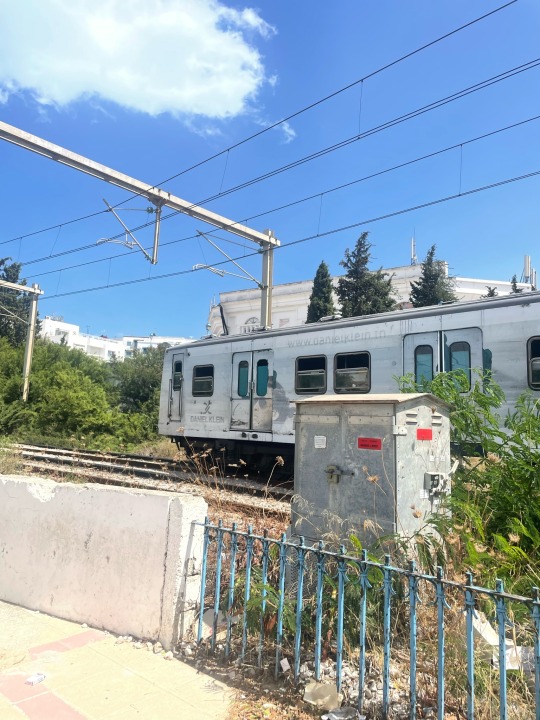
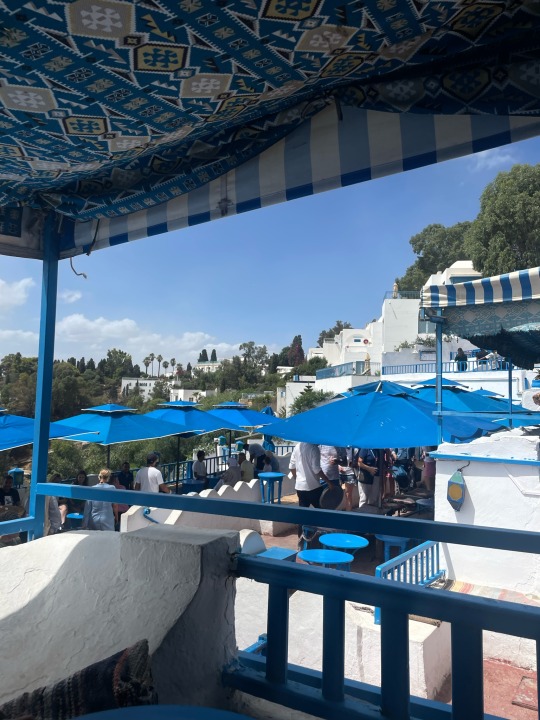
august 28th - study abroad diaries
first day of classes ! realizing how much tunisian arabic is so different from modern standard. everyone on the program here speaks a different language so we’re all trying to piece together a sentence in the hodgepodge of the tunisian language.
6 notes
·
View notes
Text
Langblr Reactivation Challenge (1.1)
Hello! I've decided to take part in this wonderful challenge compiled by @prepolyglot because it has all the structure my brain craves, and I want to try and use it to motivate myself back into consistent language study.
About Me:
My name is Lucy and my pronouns are she/her
I'm British, but currently living in Spain on my year abroad
I'm a modern languages and history student at university
Languages I'm Learning:
Spanish - I study Spanish as part of my degree, and although I have a DELE certificate to say I'm C1, I think my skills have slipped a little and I'm closer to a high B2.
German - also part of my degree, but started from beginners in my first year. I'd say I'm B1/ tentative B2, my comprehension is very good, but my production is poor. I'm looking forward to being able to improve my German during the second half of my year abroad.
Italian - my favourite language, and one I've always wanted to learn. I'm currently self-studying, but I find it difficult to keep motivated. I'm around A2 level, but maybe a B1 in comprehension. (Speaking Spanish really helps me here!)
Swedish - this July I took part in an exchange programme with my university and studied in Sweden for a month. My course was on Swedish language and culture and I loved it! I'm only A1 level but would like to keep learning.
French - this semester, I am taking French classes (taught in Spanish) whilst on my year abroad. I've only had two weeks so far but it's super fun, and I've always wanted to pick French up again after learning it in high-school.
Arabic - I am also taking a course in Arabic which is taught in German. This will be a massive challenge for me, but I'm hoping it will help reinforce my German too!
Languages I'd Like To Learn:
Catalan
Dutch
I personally really struggled with picking a language and sticking to it, hence the massive number of languages on my learning list. I'm hoping that taking classes in 4/6 of them will help me focus this year. I'm hoping this challenge will help motivate me and maybe connect with other language learners too!
12 notes
·
View notes
Text
Hello everyone I thought I’d tell y’all about myself since I’m reviving this blog
I am currently a second year university student studying elementary education and I want to teach English abroad.
I bullet journal, write to my penpals, and use my diary and art journal as a tool for coping with my mental health.
English is my first language but I’m also studying Spanish,Arabic, and Hebrew
I was raised Jewish but not born into it so I’m currently converting.
I have a chinchilla that I’m raising.
I’m a pescatarian and my favorite food is sushi
My favorite color is pink and pastels hence the blog theme
My favorite stationary are stickers they’re all over everything I own.
I enjoy anime, adult cartoons, YouTube, and movies.
I make jewelry and run a depop shop
I own so many house plants it’s insane
I collect crystals, mini animal figures (mainly cats), and anything Sanrio.
#studyblr#bullet journal#study#college#langblr#jewish#vegetarian#studying#study motivation#studyspo#stationary#stickers#pink blog#spanish#arabic#hebrew#university#teacher life#english teacher#100 days of productivity#summer study#chinchilla#retro anime#jewelry#my depop#making jewelry#lifetoblog#new study blog#new studyblr#new studyspo
2 notes
·
View notes
Text
How many Language do you know?
Knowing multiple languages has numerous benefits. Firstly, it opens up a world of opportunities for communication. When you can speak another language, you can connect with people from different cultures and backgrounds, fostering understanding and building relationships. It allows you to engage in meaningful conversations, navigate foreign countries with ease, and appreciate diverse perspectives.
Additionally, language proficiency enhances cognitive abilities. Learning a new language exercises your brain, improving memory, problem-solving skills, and multitasking abilities. It can even delay the onset of age-related cognitive decline. Bilingual individuals often exhibit greater mental flexibility and creative thinking, as they can draw from multiple linguistic systems.
Moreover, knowing multiple languages boosts employability in an increasingly globalized world. Many companies value language skills, particularly in international business and diplomacy. Being fluent in languages such as English, Japaneses, Spanish, Mandarin, Danish, or Arabic can give you a competitive edge in the job market, open up career opportunities abroad, and increase your earning potential.
Furthermore, language learning provides a deeper understanding of one's own language and culture. By comparing and contrasting different linguistic structures and expressions, you gain insights into the intricacies of your mother tongue. Learning a foreign language also immerses you in new customs, traditions, and literature, broadening your cultural horizons and fostering empathy towards others.
Lastly, studying languages is a gateway to lifelong learning. Once you master one language, it becomes easier to learn additional ones. The process of acquiring languages becomes a fulfilling journey, offering continuous personal growth and intellectual stimulation. It allows you to access a wealth of literature, music, films, and other forms of cultural expression that would otherwise remain inaccessible. Read more from TIEI for language courses and test formats for studying abroad.
In conclusion, knowing multiple languages provides countless benefits, from enhanced communication and cognitive abilities to improved employability and cultural understanding. Embracing language learning not only broadens your horizons but also enriches your life in numerous ways.
1 note
·
View note